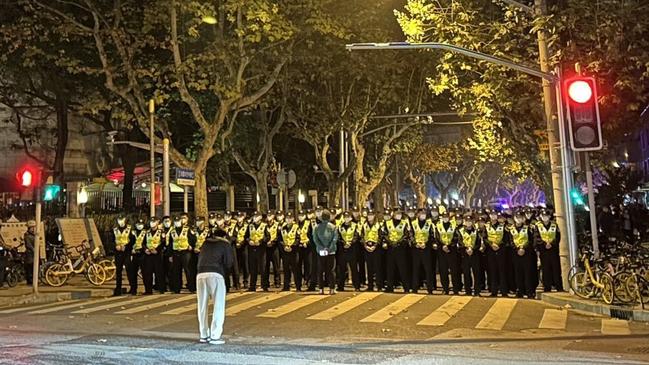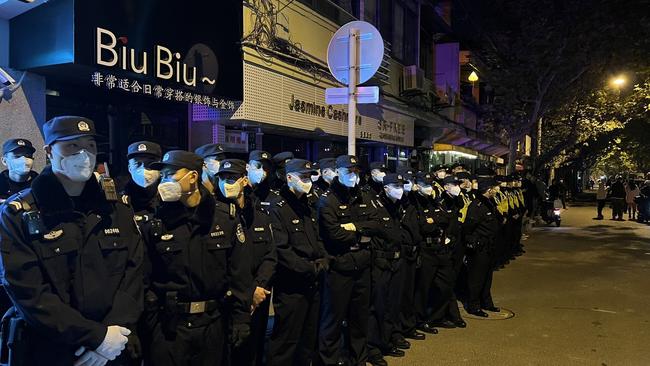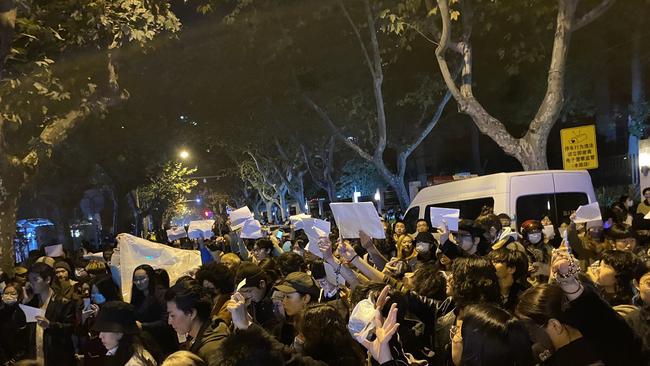Chinese cry for freedom in biggest anti-government protests since Tiananmen
Crowds chant ‘down with the Communist Party’ in an extraordinary wave of protests across China not seen since 1989’s Tiananmen massacre.

Crowds have chanted “down with the Communist Party” and “Xi Jinping, step down” in an extraordinary wave of protests across China sparked by anger at draconian Covid restrictions.
Anti-government protests on a scale not seen since 1989’s Tiananmen massacre broke out on Saturday in cities including Xi’an, Nanjing and Shanghai, three of China’s most politically influential cities.
“Down with the Communist party” an angry crowd chanted on Saturday night in Shanghai, a city of more than 25 million people that was brutally locked down for three months earlier in the year.
The protesters sang China’s national anthem and held up sheets of blank white paper, a popular symbol of resistance in China where posting anti-government slogans online or displaying them in public can result in swift arrest.
Other protesters were shockingly blunt, even as they were surrounded by large numbers of police. “Xi Jinping, step down” some shouted. Others called out “We want freedom” and “Xinjiang, end lockdown”
In Nanjing, China’s republican capital before the communists took power, hundreds of university students gathered at a night-time vigil on Saturday, shining the lights on their smartphones in unison.
Another group of students protested in Xi’an, a former imperial Chinese capital.
The largest crowds gathered in Urumqi in Xinjiang where thousands resisted police as they demanded “end the lockdown” and shouted “I don’t have money to feed myself.”
‘Down with the party! Down with Xi Jinping!’ Free Xinjiang!’ pic.twitter.com/q5jwUQrz5Z
— Eva Rammeloo (@eefjerammeloo) November 26, 2022
China’s eruption of dissent was triggered by the deaths of 20 people, including three children, in a fire in an apartment block in Urumqi on Thursday night.
Many residents linked the tragedy to Mr Xi’s signature “dynamic zero Covid” policy, which they believe stopped victims from escaping the flames, although Chinese authorities deny this.
Disturbingly for the Communist Party leadership, the spreading tumult follows weeks of riots across the country, including in Guangzhou in China’s south, Chongqing in China’s west and Beijing.

“I’ve lived in China for 30 years, and I’ve never seen such a brazenly open and sustained expression of rage … This is a serious test of CCP governance,” said David Moser, the director of Chinese Studies at Beijing Capital Normal University.
Many in China had hoped that Mr Xi’s recent re-election for an unprecedented third, five-year term as leader would lead to an easing of his stern Covid regime.
Instead, new spartan quarantine centres – called “fangcang” (square cabin) – are being built across the country, as official case numbers reach record highs.

A simultaneous flood of anger online appeared to overwhelm China’s formidable internet censorship regime over the weekend. Commenters shared stories of deaths and economic stress that have been linked to China’s heavy-handed Covid policy.
“First it was the ones who jumped, I didn’t say anything; then those who died in the bus crash … I didn’t say anything at all … then it will be me, and there is no one left to speak for me,” said one viral post.
Others posted historic revolutionary slogans, including from the 1919 May Fourth Movement, a series of anti-imperialist student protests. That era of history is a source of great sensitivity for the CCP, which tries to claim it as a source of its own legitimacy.
Many online netizens vented after seeing videos of the World Cup in Qatar, where fans from around the globe are gathered without masks.
That followed weeks of saturated Chinese media coverage of a maskless Mr Xi in Bali and Bangkok, shaking hands with other world leaders.
Even Hu Xijin, the bombastic former editor-in-chief of the party state masthead The Global Times, suggested Beijing’s policy needed to be adjusted.
However, the Communist Party’s official mouthpiece, the People’s Daily, continued to repeat Mr Xi’s orders.
“When facing the grim situation, we must unswervingly carry out ‘dynamic zero-Covid’,” the masthead editorialised at the weekend.
Several weeks ago, rumours swirled that the Covid policy would be relaxed, leading to a sharp rally of Chinese stocks.
Yanzhong Huang told The Australian the forecasts by many China-focused market economists and investors were far too optimistic. Professor Huang, a senior fellow for global health at the Council on Foreign Relations, said no change would happen until China’s leadership “gave up its zero-Covid mentality”.
He said it was surprising that over the past three months there had been “almost no progress” in increasing the vaccination rate among the elderly or in educating the public about the reduced risks of Covid among a vaccinated population.
Last winter’s Covid outbreak in Hong Kong has influenced Beijing’s refusal to change course. The city had the highest mortality rate recorded in the developed world since vaccines became available.
Ominously, China has much in common with the circumstances in Hong Kong when that wave hit: low vaccination rates among the elderly and a population with little previous immunity to the virus.
Compounding Beijing’s anxiety is its awareness of China’s under-resourced healthcare system. It has far fewer ICU beds than comparable countries, with only 3.6 critical care beds available per 100,000 people — almost a 10th of the number in Taiwan. It has also refused to allow the use of foreign-designed mRNA vaccines, including Pzfizer and Moderna, which are more effective than China’s domestic vaccines.




To join the conversation, please log in. Don't have an account? Register
Join the conversation, you are commenting as Logout